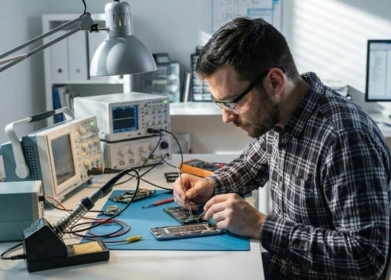Is Aerospace Engineering Hard?
Curious about aerospace engineering? Discover the challenges and rewards of pursuing this field, from rigorous academics to exciting career opportunities and innovations.
Jennifer Sheriff

If you’ve ever gazed at the night sky, marveling at the complexity of aircraft and spacecraft, you might have wondered what it takes to design and build such sophisticated machines. Aerospace engineering, the field dedicated to these endeavors, offers an exciting and challenging career path. However, if you’re considering pursuing a degree in aerospace engineering, it’s natural to wonder: Is aerospace engineering hard?
This article will explain what makes aerospace engineering a challenging yet rewarding field. We’ll explore the academic rigor, skill requirements, and real-world applications of aerospace engineering to help you make an informed decision about whether this is the right path for you.
The Complexity of Aerospace Engineering
Aerospace engineering is often considered one of the most challenging fields of study in engineering. This is largely due to the complexity and interdisciplinary nature of the field. Aerospace engineers design and develop aircraft, spacecraft, satellites, and missiles. This requires a deep understanding of various scientific and engineering principles, including:
Aerodynamics: The study of the behavior of air as it interacts with solid objects, like aircraft wings and rocket bodies. This involves complex calculations and simulations to ensure that designs are efficient and functional.
Propulsion: The science behind how engines and thrusters generate thrust to move vehicles through air or space. This includes understanding the mechanics of jet engines, rocket propulsion, and alternative propulsion systems.
Structural Mechanics: Aerospace engineers need to understand how different materials and structures withstand the forces they encounter during flight or space travel. This includes stress analysis, material science, and structural integrity testing.
Control Systems: The systems that control the flight and navigation of aircraft and spacecraft. Engineers design and analyze these systems to ensure stability and accuracy in various conditions.
Thermodynamics: The study of heat transfer and energy conversion, crucial for designing systems that can operate efficiently in extreme temperatures, whether in the high-altitude atmosphere or the vacuum of space.
Academic Rigor
Pursuing a degree in aerospace engineering typically involves a rigorous academic curriculum. Typically, employers will be looking for prospective candidates to hold at least a Bachelor’s degree in aerospace engineering. Here’s what you can expect:
Mathematics and Physics: A strong foundation in mathematics, particularly calculus and differential equations, is essential. Physics, especially mechanics and thermodynamics, is equally important. These subjects are fundamental for understanding the principles of aerospace engineering. For those who plan to continue to a Master’s degree, these fundamental math and physics courses will be invaluable.
Core Engineering Courses: Aerospace engineering programs include courses in subjects like fluid dynamics, propulsion systems, control systems, materials science, and avionics. These courses are designed to build a comprehensive understanding of aerospace systems and their interactions. Getting through these courses will generally take about four years.
Laboratory Work and Practical Experience: Hands-on experience is crucial. Aerospace engineering programs often include laboratory courses where students work on real-world problems, conduct experiments, and use sophisticated tools and simulations.
Project-Based Learning: Many programs incorporate project-based learning, where students work on team projects to design, build, and test prototypes. This provides practical experience and helps develop problem-solving skills.
Advanced Topics and Specializations: As students progress, they may choose to specialize in areas like spacecraft design, UAVs (unmanned aerial vehicles), or aerodynamics. These advanced courses go deeper into specific aspects of aerospace engineering.
Skill Requirements
Aside from academic knowledge, aerospace engineering requires a unique set of skills:
Problem-Solving Abilities: Aerospace engineers must be adept at identifying and solving complex problems. Whether optimizing a design or troubleshooting a malfunctioning system, strong analytical skills are crucial.
Attention to Detail: Precision is key in aerospace engineering. Even minor errors can have significant consequences. Engineers must pay meticulous attention to every detail of their designs and calculations.
Technical Proficiency: Familiarity with engineering software, such as CAD (computer-aided design) and simulation tools, is essential. Aerospace engineers use these tools to design and test their creations.
Teamwork and Communication: Aerospace projects often involve interdisciplinary teams. Effective communication and collaboration are necessary to ensure that all aspects of a project align and function as intended.
Creativity and Innovation: Designing new technologies and solving engineering challenges often requires creative thinking and innovative approaches. Aerospace engineers need to envision and create solutions that push the boundaries of current technology.
Real-World Applications and Career Prospects
Despite the challenges, aerospace engineering offers rewarding career opportunities. Here’s why:
Impactful Work: Aerospace engineers play a critical role in advancing technology and exploration. Their work contributes to safer and more efficient aircraft, innovative spacecraft, and groundbreaking space missions.
Diverse Career Paths: Aerospace engineering graduates can work in various sectors, including defense, aviation, space exploration, and research. Career options range from designing commercial aircraft to working on interplanetary missions.
High Demand and Competitive Salaries: The aerospace industry often offers competitive salaries and benefits. The demand for skilled aerospace engineers remains strong, driven by ongoing advancements in technology and space exploration.
Opportunities for Innovation: The aerospace field is at the forefront of technological innovation. Engineers have the opportunity to work on cutting-edge projects and contribute to significant advancements in science and technology.
Challenges and Rewards
While aerospace engineering is challenging, it also offers significant rewards. The rigorous coursework and demanding projects are balanced by the satisfaction of contributing to groundbreaking advancements and solving complex problems. Here are some aspects to consider:
Stress and Workload: Aerospace engineering can be demanding, with intense coursework and tight deadlines. Balancing academic responsibilities with personal life can be challenging. However, the ability to work on innovative projects and see your designs come to life can be incredibly rewarding.
Continuous Learning: The field of aerospace engineering is constantly evolving. Engineers must stay updated with the latest technologies and advancements, which requires a commitment to lifelong learning.
Collaboration and Networking: Working on large-scale projects often involves collaboration with other engineers, scientists, and industry professionals. Building a strong network and working effectively in teams are key components of a successful career.
Personal Fulfillment: The opportunity to work on projects that impact the world, whether through improving transportation, advancing space exploration, or contributing to national defense, can provide a deep sense of personal fulfillment and purpose.
Level Up with an Aerospace Engineering Degree
In summary, aerospace engineering is a challenging field that demands a strong foundation in mathematics and science, problem-solving skills, attention to detail, and creativity. The academic journey can be intense, with a rigorous curriculum and significant hands-on experience. However, the rewards of working on cutting-edge technologies and contributing to important advancements make it a highly fulfilling career path.
If you’re passionate about aerospace technology and ready to tackle complex problems, pursuing a degree in aerospace engineering can be a worthwhile endeavor. The challenges are considerable, but so are the opportunities to make a significant impact in an exciting and rapidly evolving field.
Related Articles

Unlocking Your Future: The Tangible Benefits of an Electrical Engineering Degree
From the smartphone in your pocket to the power grid that lights your home, electrical engineering is the invisible force shaping the modern world. It’s a discipline that translates the abstract principles of physics into the tangible technologies we rely on every day.For those considering this dynamic field, the benefits extend far beyond a challenging curriculum; a degree in Electrical Engineering (EE) is a key that unlocks a future of innovation, impact, and unparalleled opportunity.
Read More
How to Pivot Your Career: The Masters in Mechanical Engineering Roadmap
The core principles of mechanical engineering are timeless, yet their applications are constantly expanding. The rise of automation, the urgency of climate change, and the explosion of data have created new frontiers where mechanical engineers are uniquely positioned to make a significant impact. Staying relevant and seizing these opportunities often requires a deeper, more specialized skill set than what an undergraduate degree can provide.
Read More
The Best Online Engineering Degrees for Explosive Career Growth & High ROI
The rise of accredited, rigorous online engineering degrees has created an unprecedented opportunity to gain elite skills, accelerate career growth, and achieve a remarkable return on investment—all on your own terms. This article is designed to cut through the noise. We will explore the specific online engineering disciplines that offer explosive career growth, delve into what a high ROI truly means in this field, and provide a clear roadmap for selecting and financing a program that aligns perfectly with your ambitions.
Read More